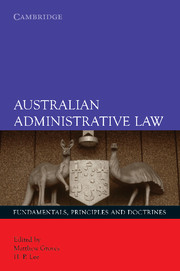Book contents
- Frontmatter
- Contents
- Foreword
- Preface
- About the contributors
- Table of cases
- Table of statutes
- 1 Australian administrative law: The constitutional and legal matrix
- 2 Administrative law in Australia: Themes and values
- 3 The public/private distinction in Australian administrative law
- 4 Australian administrative law: The human rights dimension
- 5 Administrative tribunals
- 6 Australian Ombudsman: A continual work in progress
- 7 Freedom of information
- 8 Delegated legislation
- 9 The concept of ‘justiciability’ in administrative law
- 10 Standing
- 11 Reasons for administrative decisions: Legal framework and reform
- 12 Relevant and irrelevant considerations
- 13 Improper purpose
- 14 Reasonableness, rationality and proportionality
- 15 The ‘no evidence’ rule
- 16 Failure to exercise discretion or perform duties
- 17 Procedural fairness: The hearing rule
- 18 The doctrine of substantive unfairness and the review of substantive legitimate expectations
- 19 The impact and significance of Teoh and Lam
- 20 The rule against bias
- 21 Jurisdictional error without the tears
- 22 Privative clauses and the limits of the law
- 23 Administrative law judicial remedies
- Endnotes
- Index
15 - The ‘no evidence’ rule
Published online by Cambridge University Press: 05 June 2012
- Frontmatter
- Contents
- Foreword
- Preface
- About the contributors
- Table of cases
- Table of statutes
- 1 Australian administrative law: The constitutional and legal matrix
- 2 Administrative law in Australia: Themes and values
- 3 The public/private distinction in Australian administrative law
- 4 Australian administrative law: The human rights dimension
- 5 Administrative tribunals
- 6 Australian Ombudsman: A continual work in progress
- 7 Freedom of information
- 8 Delegated legislation
- 9 The concept of ‘justiciability’ in administrative law
- 10 Standing
- 11 Reasons for administrative decisions: Legal framework and reform
- 12 Relevant and irrelevant considerations
- 13 Improper purpose
- 14 Reasonableness, rationality and proportionality
- 15 The ‘no evidence’ rule
- 16 Failure to exercise discretion or perform duties
- 17 Procedural fairness: The hearing rule
- 18 The doctrine of substantive unfairness and the review of substantive legitimate expectations
- 19 The impact and significance of Teoh and Lam
- 20 The rule against bias
- 21 Jurisdictional error without the tears
- 22 Privative clauses and the limits of the law
- 23 Administrative law judicial remedies
- Endnotes
- Index
Summary
‘No evidence’, law versus facts and the ‘legality-merits’ distinction
Generally, courts have been reluctant to interfere by way of judicial review in the manner in which decision makers assemble facts and evidence so that the extent to which an absence or insufficiency of evidence constitutes a basis for judicial review has been difficult to determine precisely. This judicial reluctance to evaluate the evidence on which a decision is based reflects the ‘critical line between factual and legal matters’ and the historical importance which the law attaches to the conventional distinction between errors of law and errors of fact. As Aronson, Dyer and Groves have explained, the fact/law distinction is a fundamental tenet of legal doctrine, observable in most areas of law, albeit one of notorious difficulty in application. In a criminal trial, for instance, the role of the judge is to declare the law whilst the function of the jury is to determine the facts and in the process of litigation generally, the function of higher or appellate courts is mostly confined to resolving questions of law.
In administrative law, the fact/law distinction is readily observable in the relationship between administrative appeals and judicial review. In most systems of administrative decision-making, an appeal from a primary decision maker to a higher administrative official or tribunal usually means a re-hearing of the facts and evidence. On the other hand, intervention by way of judicial review means that the role of the court is confined to the correction of legal errors.
- Type
- Chapter
- Information
- Australian Administrative LawFundamentals, Principles and Doctrines, pp. 233 - 252Publisher: Cambridge University PressPrint publication year: 2007



